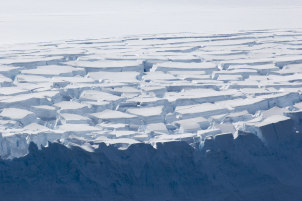Global emissions of carbon dioxide were at a record high in 2011 and are likely to take a similar jump in 2012, scientists reported Sunday — the latest indication that efforts to limit such emissions are failing.
Emissions continue to grow so rapidly that an international goal of limiting the ultimate warming of the planet to 3.6 degrees, established three years ago, is on the verge of becoming unattainable, said researchers affiliated with the Global Carbon Project.
Josep G. Canadell, a scientist in Australia who leads that tracking program, said Sunday in a statement that salvaging the goal, if it can be done at all, “requires an immediate, large and sustained global mitigation effort.”

 Environmental Glance
Environmental Glance Fueled by global warming, polar ice sheets in Greenland and Antarctica are now melting three times faster than they did in the 1990s, a new scientific study says.
Fueled by global warming, polar ice sheets in Greenland and Antarctica are now melting three times faster than they did in the 1990s, a new scientific study says. Led by Dr. David O. Carpenter, Director of the Institute for Health and the Environment at the University at Albany’s School of Public Health, a number of health experts launched a new initiative, Concerned Health Professionals of New York, to outline the health risks of fracking and to renew their call for an independent, comprehensive Health Impact Assessment.
Led by Dr. David O. Carpenter, Director of the Institute for Health and the Environment at the University at Albany’s School of Public Health, a number of health experts launched a new initiative, Concerned Health Professionals of New York, to outline the health risks of fracking and to renew their call for an independent, comprehensive Health Impact Assessment. Hurricane Sandy might be fresh in the American public's memory, but for advocates seeking action on climate change time is running out. At a recent event, engineering, disaster preparation and climate science professors at Columbia University urged lawmakers to take advantage of the public's post Hurricane Sandy interest in global warming and push through bold policies.
Hurricane Sandy might be fresh in the American public's memory, but for advocates seeking action on climate change time is running out. At a recent event, engineering, disaster preparation and climate science professors at Columbia University urged lawmakers to take advantage of the public's post Hurricane Sandy interest in global warming and push through bold policies.






























